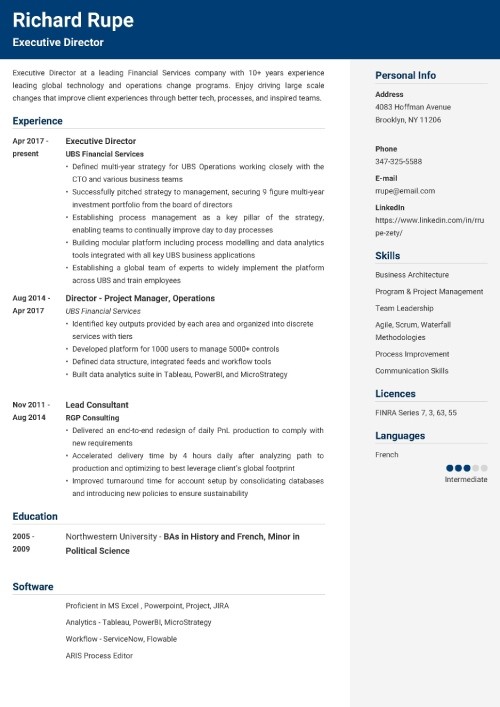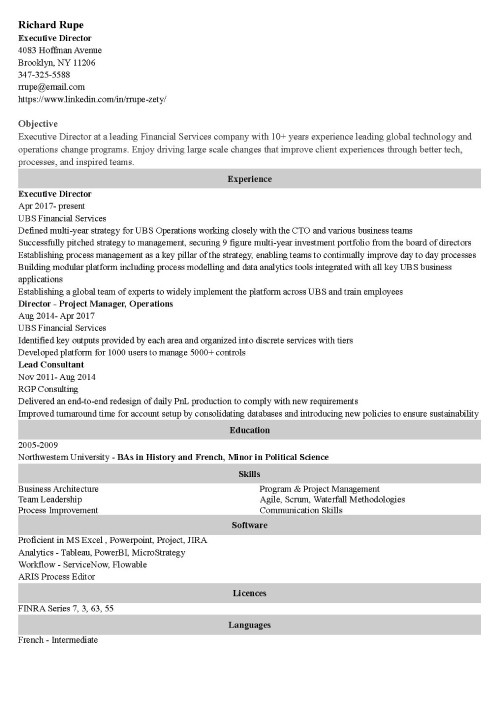Why is critical thinking essential? Firstly, that’s what almost every employer seeks. Secondly, in the era of fake news, contrasting data, and so much information to process every day, critical thinking is the only way to make sense of this world.
Good thing you came to the right place for everything you need to know about critical thinking skills!
This guide will show you:
- A simple critical thinking definition that explains everything.
- How to use critical thinking skills step by step.
- Examples of critical thinking skills for the workplace.
- How to improve critical thinking with simple exercises.
Want to save time and have your resume ready in 5 minutes? Try our resume builder. It’s fast and easy to use. Plus, you’ll get ready-made content to add with one click. See 20+ resume templates and create your resume here.
Sample resume made with our builder—See more resume examples here.
Want to learn more about listing all kinds of skills on a resume? See our guide for the ultimate list of the Best Job Skills to Put on a Resume.
If you are looking for specific skill sets for your resume, check:
- Analytical Skills Examples
- Problem-Solving Skills Examples
- Creative Thinking Skills Examples
- Communication Skills for Your Resume & Workplace Success
- Hard Skills for Any Resume
- Computer Skills Employers Want
- Soft Skills vs Hard Skills for a Job: What Employers Look for
What Is Critical Thinking?
Critical thinking is the ability to think in an organized and rational manner to understand connections between ideas and/or facts. It helps you decide what to believe in. In other words, it’s “thinking about thinking”—identifying, analyzing, and then fixing flaws in the way we think. Critical thinking includes many skills that can make your daily life easier. Here are the most important ones.
What Are the Critical Thinking Examples?
- Analysis: the ability to collect and process information and knowledge.
- Interpretation: concluding what the meaning of processed information is.
- Inference: assessing whether your knowledge is sufficient and reliable.
- Evaluation: the ability to make decisions based on the available information.
- Explanation: communicating your findings and reasoning clearly.
- Self-Regulation: the drive to constantly monitor and correct your ways of thinking.
- Open-Mindedness: taking into account other possibilities and points of view.
- Problem-solving: the ability to tackle unexpected problems and resolve conflicts.
For some people, these things come naturally. They complete all of these complicated thought processes automatically without even noticing it. But that’s not the case for everyone. Thankfully, it’s possible to develop and improve critical thinking skills entirely on your own—and I’ll talk about it a bit later in this guide.
Critical thinking skills improve your employability, but don't forget to add other skills. We analyzed 11 million resumes created in our builder to find the most commonly added skills. Here are the top 10:
- Teamwork and Collaboration
- Problem-solving
- Excellent Communication
- Multitasking
- Attention to Detail
- MS Office
- Analytical and Critical Thinking
- Data Entry
- Project Management
- Team Management
Why Is Critical Thinking Important?
When you think critically, you constantly challenge what seems obvious. Imagine a situation where you join a project team using a complicated spreadsheet to track updates. Everyone seems happy with it, but you know how to improve this document. You use your Excel skills to tweak the spreadsheet, and now, it works 10x better. That’s how critical thinking works.
Critical thinking skills are the cornerstone of self-development and improvement. That’s why they’re so critical in today’s job market. Just think about this—A recent report by the AACU revealed that 93% of employers value critical thinking over the candidate’s undergraduate degree.
Critical thinking is a conceptual skill. Read more about them here: What Are Conceptual Skills?
How to Develop Critical Thinking Skills?
Good news—you can develop critical thinking skills by yourself. There are different methods you can use, and in this chapter, I’ll describe them in detail.
1. Get to Know Critical Thinking Steps
When you’re faced with an issue, follow the steps outlined below. They will show you how to think critically:
- Identify the problem or question: be as precise as possible; the narrower the issue, the easier it is to find solutions or answers.
- Gather data, opinions, and arguments: try to find several sources presenting different ideas and viewpoints.
- Analyze and evaluate the data: are the sources reliable? Are their conclusions data-backed or just argumentative? Is there enough information or data to support the given hypotheses?
- Identify assumptions: are you sure the sources you found are unbiased? Are you sure you weren’t biased in your search for answers?
- Establish significance: what piece of information is most important? Is the sample size sufficient? Are all opinions and arguments relevant to the problem you’re trying to solve?
- Make a decision/reach a conclusion: identify possible conclusions and decide which (if any) of them are sufficiently supported. Weigh the strengths and limitations of all possible options.
- Present or communicate: once you’ve reached a conclusion, present it to all stakeholders.
Using these steps can be difficult at first, but it’ll become easier with practice.
2. Ask Simple Critical Thinking Questions
Keeping all the steps outlined above in mind can indeed be difficult. But there’s a simpler way—just ask yourself some easy critical-thinking questions, such as:
- What do I already know?
- How do I know that?
- What am I trying to prove?
- What are my motivations?
You can do that in everyday situations. For example, when you and your colleagues can’t decide where to go for lunch, approach this matter critically—consider all the available options and analyze the motivations behind every choice. A simple exercise like this can help you improve critical-thinking skills.
3. Oppose “Common Sense”
The problem with common sense is that it’s so… common. “No way this business idea can ever be profitable. ”Oh, really? Why exactly not? Ramit Sethi is making a killing selling a $300 online course on choosing a good personal assistant. If that’s profitable, think about what else can be.
4. Be Aware of Your Biases
The most common types of cognitive bias you need to avoid are:
- Confirmation Bias: we always subconsciously assume we’re right.
- Action Bias: we act too quickly before thinking something through.
- Association Bias: why did the rain dance always work? Because they’d dance until the rain came.
Unconscious bias is so common it exists in all areas of our lives, including the workplace. Bias can also negatively affect hiring decisions. If you want to hone your critical thinking skills, you must learn to avoid it. Again, it can be difficult at first. However, becoming more aware of it is the first step to success.
5. Read a Lot
Reading will not only help develop your critical thinking skills but also help improve other skills employers look for. To get a sound start on the theory and strategies behind critical thinking, check out these books on critical thinking:
- Critical Thinking for Dummies
- How to Think Critically: A Concise Guide
- Critical Thinking Skills: Effective Analysis, Argument and Reflection
- Critical Thinking: Your Guide to Effective Argument, Successful Analysis and Independent Study
- What is Unconscious Bias? (+How to Avoid It in the Workplace)
Now that you know different ways of improving critical-thinking skills, let’s go through how to showcase them on a resume to boost your chances of landing a better job.
Critical thinking is a significant part of being an effective manager. Learn more: Top 10 Management Skills You Need to Master
Critical Thinking Skills on a Resume
Say, you’re applying for a job, and the job description requires “critical thinking skills.” Adding them to your resume skill list and saying voilà won’t do much. You need to prove you can think critically by giving real-life examples of how you used your critical thinking skills.
The best way to present and validate your critical thinking skills is to include examples of them in your past work experience bullet points. Just like in these examples:
Example of Critical Thinking Skills on a Resume: Work Experience Section
Critical Thinking on a Nursing Resume—Example
- Evaluated and analyzed cases at hand to determine the priority of treatment.
- Clearly communicated and explained my rationales to doctors and other members of the nursing staff.
Critical Thinking Skills Examples for an Engineering Resume
- Identified 8 major hidden design defects with failed constructions.
Critical Thinking Skills Examples—Customer Service
- Interpreted the results of phone surveys to develop a new strategy for handling customer complaints.
You get the drill, right? Show, don’t tell.
If you’re writing an entry-level resume and don’t have work experience yet, don’t worry. You can use other experiences to prove you know how to think critically. For example, fill the education section of your resume with extracurricular activities and research projects, describe internships you’ve completed, and mention personal projects, volunteer work, or even personal interests.
Check these examples of critical-thinking skills in different resume sections:
Example of Critical Thinking Skills on a Resume: Education Section
B.Sc. in Psychology
Nashville University, TN
September 2019–June 2023
GPA: 3.9
- Authored a dissertation on the following topic: “Developing critical thinking skills in primary school students”
- Member of the debate society in the years 2020–2022.
Critical Thinking Skills Examples on a Resume: Additional Sections
Personal Projects
- Runs a personal blog with reviews of teaching aids and critical analyses of coursebooks for teaching English to primary students.
Volunteer Work
Paws Dog Shelter, 2020–present
- Improved the filing system for tracking down donations and funds using interactive spreadsheets.
- Initiated a new method for researching and contacting potential donor organizations.
Interests
- Trying out new gardening techniques and tracking progress on a personal Instagram account.
Remember that your critical thinking skills might also be evaluated during job interviews. Again, interviewers will want to see specific examples of how you put your critical thinking to use. The next chapter shows examples of how to tackle such questions.
Critical Thinking Interview Questions
Are you preparing for a job interview? If your desired position requires critical thinking skills, there’s a pretty good chance that you’ll hear popular job interview questions designed to evaluate this particular skill set. Here are examples of questions you might hear:
1. Describe a situation where you challenged how you and your colleagues did their jobs.
Our online ordering page lets clients order incompatible components, causing heavy complaints. I asked if we could put a product check in place. The software engineer added warnings when two products weren’t compatible. Complaints went down by 35%.
This answer shows:
- Self-regulation
- Problem-solving
2. Describe a situation where you saw a problem and took steps to fix it.
Our rechargeable forklifts had two different plugs. If you used the wrong one, you could wreck a $3,500 battery. I added zip-ties as cord-shorteners so you could only reach the right outlet. We haven’t lost a battery since.
This answer shows:
- Evaluation
- Problem-solving
3. Tell me about a time you had to persuade someone to see your side.
The owner was convinced our gift shop was a moneymaker. I analyzed our cash flow and found it was running at a 10% deficit. I built data visualizations that showed we could increase store revenue by 40% by focusing on more popular products.
This answer shows:
- Analysis
- Interpretation
- Explanation
Most of the interview questions that test critical thinking are situational interview questions. You can learn all about how to handle them from this guide: Toughest Situational Interview Questions and Best Answers
Plus, a great cover letter that matches your resume will give you an advantage over other candidates. You can write it in our cover letter builder here. Here's what it may look like:
See more cover letter templates and start writing.
Key Takeaway
Here’s all you need to know about critical thinking skills in a nutshell:
- The key critical thinking skills are analysis, interpretation, inference, explanation, self-regulation, open-mindedness, and problem-solving.
- To apply the basic principles of critical thinking, follow these steps: identify the problem, gather data, analyze and evaluate, identify assumptions, establish significance, make a decision, and communicate.
- To become a better critical thinker: ask simple questions, challenge common assumptions, be aware of your biases, and read more.



